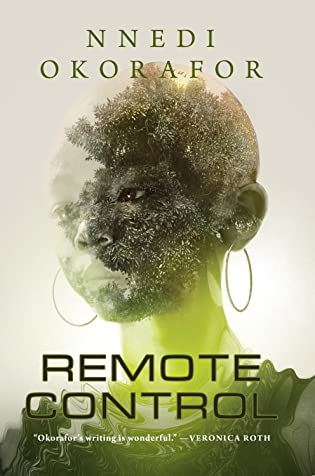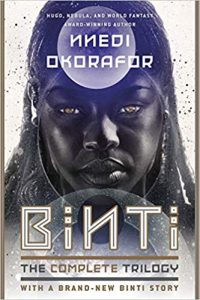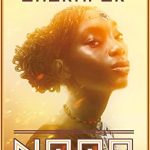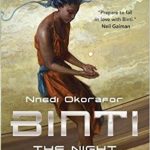 Remote Control by Nnedi Okorafor
Remote Control by Nnedi Okorafor Format: eARC
Source: supplied by publisher via Edelweiss
Formats available: hardcover, ebook, audiobook
Genres: African Futurism, science fiction
Pages: 160
Published by Tordotcom on January 19, 2021
Purchasing Info: Author's Website, Publisher's Website, Amazon, Barnes & Noble, Kobo, Bookshop.org
Goodreads
The new book by Nebula and Hugo Award-winner, Nnedi Okorafor.
"She’s the adopted daughter of the Angel of Death. Beware of her. Mind her. Death guards her like one of its own."
The day Fatima forgot her name, Death paid a visit. From hereon in she would be known as Sankofa--a name that meant nothing to anyone but her, the only tie to her family and her past.
Her touch is death, and with a glance a town can fall. And she walks--alone, except for her fox companion--searching for the object that came from the sky and gave itself to her when the meteors fell and when she was yet unchanged; searching for answers.
But is there a greater purpose for Sankofa, now that Death is her constant companion?
My Review:
Remote Control is the story of Sankofa, the adopted daughter of the Angel of Death. Or so the legends go.
When I first read the blurb for this book, my first thought was that Sankofa was someone like Susan Sto-Helit in Terry Pratchett’s Discworld. In that fantasy world, Susan is really the adopted granddaughter of Death, the anthropomorphized personification of the Grim Reaper, who rides a pale horse named Binky and likes cats. This is a fantasy world where anything can, and frequently does, happen.
But Remote Control is not set in a fantasy world. Instead, this is a not-too-distant future of our own world, set in an Africa where jelli-tellies and even-smarter smartphones are coveted and sold and where legends that feel as if they are out of the distant past walk the earth at the same time.
This is not a fantasy, no matter how much it reads like one.
Sankofa is not, technically, the adopted daughter of the Angel of Death, no matter how many such stories get wrapped around her small, slim person.
But she is death. Or she brings death. Or she can. Or all of the above. Once upon a time, when she was an even younger child than she is now, a meteor shower dropped meteorites like little seeds over her father’s shea tree orchard.
One of those meteorites WAS a seed. A seed that Sankofa before she became Sankofa, back when she was a little girl named Fatima, nurtured and petted and talked to as if it were a person and a confidant and a pet.
Whether it was the girl’s care of that seed, or whether it was the seed’s intended purpose all along, the seed gave her a gift – or a curse. And when that seed was stolen from her, that gift bloomed from her like a toxic gas.
When she became angry, or upset, or was in pain, the little girl burned hot and glowed green like poison. Whatever that green glow touched fell down dead. Like the mosquitos that loved to eat her. Like her parents who sold her little seed for a lot of money. Like everyone in the village who was just too close when her pain and anger overcame her – including her family.
Like her name and her memory that burned away in the fire of that green. She left Fatima behind among the dead of her village and wandered the roads as Sankofa, searching for the seed that was stolen from her.
Only to discover, once she found it, that it was even more of a curse than she ever believed.
 Escape Rating A: Remote Control is a novella, meaning that it is relatively short but complete in and of itself. So if you love SF and have not yet read any of Nnedi’s books, this is a great place to start. As is her absolutely awesome Binti, which is both a novella and the first in her epic and marvelous Binti Trilogy of novellas.
Escape Rating A: Remote Control is a novella, meaning that it is relatively short but complete in and of itself. So if you love SF and have not yet read any of Nnedi’s books, this is a great place to start. As is her absolutely awesome Binti, which is both a novella and the first in her epic and marvelous Binti Trilogy of novellas.
Novellas are shorter than novels, but longer than novelettes or short stories. They are not novels that got cut down. Rather, novellas are the length that they are meant to be, they’re meant to be the length that they are. They may tease at a larger world or deeper background or more that happens after they close – or all of the above – but they complete their own story in their shortness, and are great ways to introduce yourself to a new-to-you author.
Which doesn’t mean that I don’t frequently wish that a particular novella had a bit more to it, because I often do. But then, I love worldbuilding when it’s good and I always want more.
Remote Control is a bit of a tease of a story, because at first it seems more like a fantasy than SF. In Sankofa’s childish perspective – after all the story begins when she is only 5 – we don’t see much in the way of SFnal trappings. Her family farm and her world could be in a wide range of eras.
It’s only after Fatima becomes Sankofa and takes herself away from home and tragedy that we see the wider world and learn that this is the relatively near future. It’s a world that we can sort of see from here, if we squint a bit.
As Sankofa travels, we see her grow, and follow along as her legend grows with her – and she learns how to take advantage – but not too much – of that legend. People give her what she needs both because they are afraid of what she brings. She brings death. She can kill an entire village. She has. She can lash out in fear and/or self-preservation. And she can bring release to those who desperately need it.
And we watch her try to leave her legend and her gift behind, to grasp at some semblance of what passes for “normal”, only for that gift to reach out and grab her back.
Remote Control is the story of Sankofa’s coming of age and her coming to terms with who and what she is. But I’ll admit that I didn’t figure out where the title came from until the very end. And that when I did, it made the whole story into a much bigger WOW than I expected.
A revelation that I’m still reeling from a bit. And you will too if you follow along on Sankofa’s journey to its bittersweet but triumphant end.






















